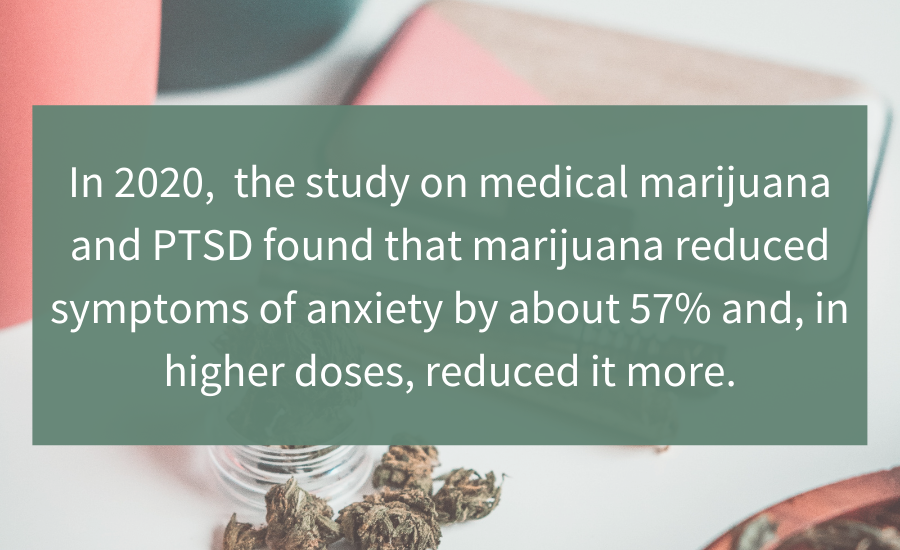Short answer: Every year the number of qualifying conditions for obtaining a medical marijuana card in Arizona is growing. At the moment, only one mental illness is considered a legal reason for obtaining a weed card – this is PTSD.
According to studies, many people with mental health disorders self-medicate with marijuana. They find it reduces their mental health symptoms and improves their quality of life. Current medical marijuana research in Arizona found that medical marijuana may indeed provide benefits for people with “psychiatric disorders” such as anxiety, post-traumatic stress disorder (PTSD,) depression and obsessive-compulsive disorder (OCD.)
If you’re such a person and you live in Arizona, you may be able to get a medical marijuana card for your mental health condition.
Why Get a Medical Marijuana Card for Mental Health in Arizona
Of course, your first question may be: Why should you care? Arizona has legalized adult-use, or “recreational”, marijuana in addition to medical marijuana. So, why would you want to go through all the trouble and expense of getting an Arizona medical marijuana card when you could just purchase recreational marijuana for your mental health concerns?
Here are some reasons:
- You’re too young. – To purchase recreational marijuana, you must be 21 or older. There is no age minimum for medical marijuana, though, if you’re a minor, you need a parent or guardian to sign up as your caregiver.
- The marijuana is stronger. – Medical marijuana sold at dispensaries is allowed to have a higher concentration of cannabinoids than marijuana sold at adult-use dispensaries. Marijuana edibles, as well, are allowed to be stronger when they’re medical rather than recreational.
- The marijuana is higher quality. – Quality standards for medical marijuana cultivators and medical marijuana product manufacturers, like the makers of tinctures and edibles, are much higher than those for cultivators who sell their marijuana to adult-use dispensaries.
- The marijuana is cheaper. – Because it’s serving medical patients in need, medical marijuana is sold at lower prices than adult-use marijuana.
- You can buy more. – Medical marijuana patients can buy and possess up to 2.5 ounces of medical marijuana in any 14-day period. Recreational marijuana users can only buy and possess up to one ounce every 14 days.
- The dispensary lines are shorter. – Only a fraction of the adults in Arizona have medical marijuana cards.
- It’s not really expensive or a hassle. – When you use Affordable Certification to get your medical marijuana card using telehealth, it’s both easy and affordable. (See more on that below.)
Qualifying Conditions for Medical Marijuana in Arizona
The list of qualifying conditions in Arizona for medical marijuana currently contains 13 medical conditions, those being:
- Alzheimer’s Disease
- Amyotrophic Lateral Sclerosis, or Lou Gehrig’s disease
- Cachexia, or wasting syndrome
- Cancer
- Chronic pain
- Crohn’s Disease
- Glaucoma
- Hepatitis C
- HIV or AIDS
- Nausea
- Persistent Muscle Spasms
- PTSD
- Seizures
For all other medical conditions, you can only get a medical marijuana card if your condition is related to or a symptom of a condition on the list.
Mental Health Conditions and Their Medical Marijuana Status in Arizona
So, what about mental health conditions? Can you get a medical marijuana card for any of those? Let’s look deeper now into some of the most common mental health conditions and see. We’ll also discuss what is currently known and understood about medical marijuana for mental health disorders and conditions and how to get a mental health condition or disorder that currently doesn’t qualify for medical marijuana on the qualifying conditions list.
Anxiety
Generalized Anxiety Disorder (GAD) has been considered for inclusion on Arizona’s list of qualifying conditions for medical marijuana, but has yet to be approved for it. No other forms of anxiety are included on the list, either, or have been considered for inclusion.
Read also: Getting Your Medical Card for Anxiety in Detail.
Current research on anxiety and medical marijuana
A 2015 study on marijuana and anxiety found that cannabidiol (CBD), one of the cannabinoids, or active compounds, in marijuana, had “considerable potential as a treatment for multiple anxiety disorders.”
In 2020, another study on medical marijuana and PTSD found that marijuana reduced symptoms of anxiety by about 57 percent and, in higher doses, reduced it more.
Depression
Depression is not currently listed as a qualifying condition for medical marijuana in Arizona, although, like GAD, it has been considered. However, you can qualify for medical marijuana in Arizona with depression or chronic depression if it is a symptom of or expresses itself as one of the conditions that is on the list.
For example, your cancer may be causing you to be depressed; or, your depression may be manifesting as nausea. Similarly, your depression could aggravate your chronic pain, or your chronic pain could trigger your depression. In each case, the doctor can recommend medical marijuana to you for, respectively, cancer, nausea or chronic pain. You can, then, use medical marijuana to treat your depression or chronic depression.
Read also: Can You Get a Medical Marijuana Card for Depression in Arizona?
Current research on depression and medical marijuana
There is little current evidence supporting the use of medical marijuana to treat depression. There is a great deal of reports, however, of the number of people who self-medicate with marijuana to treat their depression because they find it relaxes them and improves their mood.
PTSD
As seen in the introduction to this article, PTSD is listed as one of the qualifying conditions for medical marijuana in Arizona.
The ADHS considers medical marijuana a secondary or supplementary treatment for PTSD rather than a primary one. According to an ADHS Substantive Policy Statement on medical marijuana for PTSD, to qualify a patient for medical marijuana under a diagnosis of PTSD, the doctor must also include in the patient’s medical marijuana recommendation that the patient is receiving other treatment for PTSD besides medical marijuana.

Current research on PTSD and medical marijuana
The study cited earlier on marijuana and PTSD also found that marijuana inhaled lowered acute PTSD symptoms by 50 percent; that means people in the midst of experiencing PTSD symptoms cut those symptoms in half by inhaling marijuana.
Obsessive-compulsive Disorder
Arizona does not include OCD on its qualifying conditions list. But, again, if it’s a symptom or cause of another condition, you could get a medical marijuana card with a diagnosis for that other condition.
Current research on OCD and medical marijuana
The literature on medical marijuana for OCD is compelling, so far. A 2020 case report and review of literature on the subject found medical marijuana improved OCD symptoms.
Information on bipolar disorder and cannabis
Bipolar disorder is not one of the qualifying conditions for medical marijuana in Arizona. However, Medical News Today reports that many people with bipolar disorder use marijuana to treat and manage their symptoms. And, a summary of the scientific and therapeutic applications of marijuana for mental disorders includes support for its possible benefits for those with bipolar disorder.
Research varies on the potential benefits of medical marijuana for bipolar disorder. Some suggest it can improve the condition, others suggest it can worsen the condition, while still others suggest it can improve certain symptoms while worsening others. Oftentimes, the difference between the recognition or rejection of medical marijuana’s potential benefits for bipolar disorder comes down to the difference between anecdotal and scientific evidence. That said, the amount of anecdotal evidence supporting medical marijuana’s use for bipolar disorder far exceeds the amount of scientific evidence suggesting more research is still required to be sure.
In one clinical research review, personal accounts from people with bipolar disorder who used marijuana to treat their symptoms include assertions that it:
- Was more effective than traditional medications
- Helped alleviate the side effects of traditional medications
- Curbed manic rages
- Enabled them to reduce their lithium intake or alleviate lithium’s side effects
In another study, this one specifically exploring marijuana’s effects on mood and cognition in people with bipolar disorder, participants reported that, within four hours of using marijuana, they felt less anger, tension and depression and higher energy levels. Similarly, another study on the effects of marijuana on mood in patients with bipolar disorder found that it helped to relieve mood-related symptoms of bipolar disorder in at least some people with the disorder. Meanwhile, a study examining the relationship between marijuana and mental functioning in people with bipolar disorder found no evidence that using marijuana significantly impaired the cognition of people with the disorder. A 2010 study found that marijuana use may also help improve certain bipolar disorder symptoms like memory, attention and reasoning speed.
Medical Marijuana and Mental Health
In an interview for a Prescott eNews 2021 article on marijuana and mental health, Carrie Cutler, a Washington State University assistant professor of psychology, said, “What we generally find across the board for depression, anxiety, stress, OCD symptoms, PTSD symptoms, is approximately 50% reductions in the severity of these symptoms from immediately before, to immediately after cannabis use.”
Funding in AZ Medical Marijuana Bills for Mental Health Research and Services
The latest medical marijuana bill by the 2022 Arizona legislature doesn’t contain the words “anxiety,” “depression,” or “obsessive-compulsive disorder,” etc. anywhere in the text. However, it does contain allocations of funds to go specifically toward mental health, including:
- $2 million in research to improve mental health services, education and research in the state
- $2 million to help doctors repay loans they took out to set up practice, with priority given to those doctors practicing mental health care and behavioral health care
- $2 million to help fund student loans through the State Medical Board of Arizona, with priority given to those students enrolling in psychiatry programs and others focusing on treating mental illness
Given the increasing research supporting the use of medical marijuana for mental health conditions and the medical and scientific communities’ increasing recognition of the therapeutic benefits of medical marijuana for mental health conditions, Arizona may finally add more mental health conditions to the list.
Telehealth for Medical Marijuana Cards for Mental Health
As Arizona works to make medical marijuana available to more patients in need of it, including those with mental health conditions, telehealth works to make it simpler for those patients to get the medical marijuana card they need to access that medical marijuana. For many patients, telehealth may be the only option for getting the medical evaluation and recommendation they need for their AZ MMJ card.
Fortunately, Arizona now permits the use of telehealth services for medical marijuana evaluations and recommendations, including for mental health disorders, conditions and symptoms, when appropriate. For more info on using telehealth to get your Arizona medical marijuana card, contact affordablecertification.com.
In Summary
Since at least 2012, Arizona’s Revised Statute on debilitating conditions allows the public to petition the state each year to add new mental health conditions as qualifying conditions for medical marijuana, including Generalized Anxiety Disorder, Depression and Post-traumatic Stress Disorder. So far, only one of these has made the list. However, in light of evidence like that above, it seems, as every year’s petition period comes, the day comes closer when those other mental health conditions, too, and more still help people with mental health concerns get the medical marijuana they need.
If you have a mental disorder of any kind, you may want to consider taking medical marijuana to relieve your symptoms. To find out all the detailed information, and get feedback on your diagnosis, book an online appointment with one of our qualified doctors. Our certified doctors will help you figure it out and if you qualify, they will assist you in applying for a medical card online.

